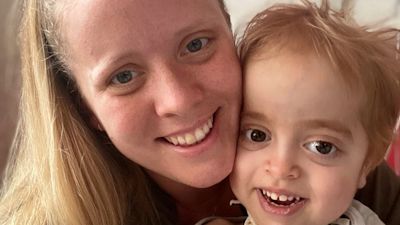'Overlooked’ disabled families feeling the pain of rising costs after chancellor's spring statement

ITV News Anglia's Graham Stothard met families counting the rising cost of living
Families with disabled children say they have been "overlooked" by the government - as they struggle with soaring bills to give their youngsters quality of life.
Charities have warned that the rising cost of energy could push more than two million more families with a disabled member into fuel poverty.
Emma Whitmore's son Alfie needs round-the-clock care and uses equipment including an electric wheelchair, monitors and other machines which require regular charging.
That means that her bills are going up more than most at the moment, and she feels let down by the measures announced by Chancellor Rishi Sunak in his spring statement on Wednesday.
"Alfie has a lot of equipment that needs charging regularly, so he has suction machines, various other SATS monitors and things that we have to charge, through the night and through the day," Ms Whitmore told ITV News Anglia.
"It's just a lot - it's already a lot. We already pay a higher bill than your average person and it's increasing."
Alfie, who lives in Braunston in Northamptonshire with his family, has Marshall Smith syndrome - a rare condition which can cause problems with the patient's skeleton and breathing, and lead to learning difficulties - and relies on the equipment to support a good quality of life.
Ms Whitmore said: "I think families like ours are really overlooked.
"I don't think they take us into consideration [given] the amount of electricity we do have to use for children like Alfie and adults alike.
"I don't think we're taken into account a lot of the time. I think we're very much overlooked, and it's tough."
That frustration is also felt by Hayley Charlesworth from Newnham in Northamptonshire, who has a seven-year-old son, Harry, with cerebral palsy.
He also needs near-constant care and attention, and a variety of devices to make life manageable.
In 2020, Ms Charlesworth set up Harry’s Pals Trust, to help other families who were bringing up disabled children.
She said the cost of living crisis could severely impact parents’ mental and emotional health.
“I think it could be the straw that broke the camel's back," she said.
"I think people's emotional health is very fragile as it is, and being a carer is very difficult already, and impacts on people in terms of anxiety and depression.
"So to have gone through that, got through the pandemic, and now the concern over being able to afford your electricity and your gas and just to be able to stay in your own home is a massive worry.”
In his spring statement on Wednesday, Mr Sunak announced a 5p cut in fuel duty and an increase in the threshold at which people pay national insurance contributions, benefiting around 30 million workers with a tax cut worth more than £330.
He also promised further support in 2024 with a pledge to cut the basic rate of income tax from 20p in the pound to 19p – “a £5 billion tax cut for over 30 million people”.
The chancellor did announce an extra £500m for the Household Support Fund - a measure dismissed by the Institute for Fiscal Studies as “not very much”.
Disability charity Scope has warned if average energy bills soar to £3,000 a year as predicted, 2.1 million households across the UK where one or more members are disabled will still be pushed into fuel poverty.
This compares to 900,000 households today.
Other research Scope has carried out reveals:
Just over two-fifths of disabled people (43%) said they needed to use more energy to meet their needs;
Disabled people are more than twice as likely to be unable to heat their home;
Disabled people are three times as likely to not have been able to afford food;
76% of disabled people who have seen rising living costs have had to tighten their belts and cut household spending